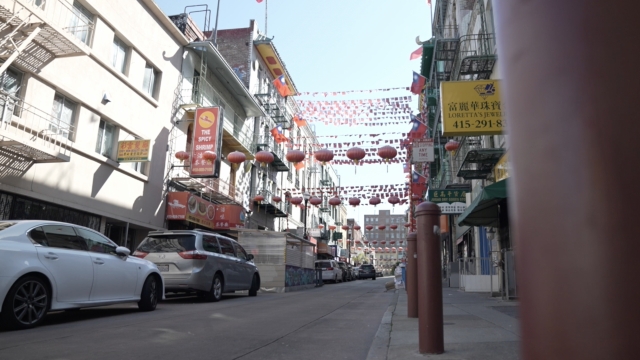The sights and sounds of Chinatown are unmistakable. For Lily Lo, they are part of what feels like home.
"Chinese culture is very important, and I really want the next generation to keep it up," Lo said.
She is a leader with BeChinatown, a nonprofit working to enhance its diverse community and provide resources.
She showed Scripps News around San Francisco's Chinatown and highlighted its authentic offerings.
"I want to contribute back to the community," Lo said.
However, she says there's an underlying worry you don't see: Residents are concerned Chinatown is losing its identity.
"I don't want to see Chinatown die," Lo continued.
Locals, like Lo, are worried about Chinatowns becoming nonexistent.
Jonathan Sit, with the Chinatown Volunteer Coalition, feels the same because of his roots that are connected to these streets.
"I Identify myself as Chinese American, specifically Cantonese American, which is southern Chinese," Sit said.
He says desolate streets throughout the pandemic and an increase in xenophobic discrimination created worry.
For families just like his, Chinatowns have served as a safe haven for Chinese immigrants.
"Some of my relatives, they immigrated maybe 10 years ago and when they first got here, the first thing they did was look for resources," Sit said. "And those resources were in Chinatown, whether it be how to get citizenship, it would teach you English using Cantonese, how to get health care, if you have a child how do you enroll them in school."
Even before the pandemic, residents were seeing changes.
According to the U.S. Census Bureau, some of America's most prominent Chinatowns had declines in their Asian population between 1990 and 2020.
New York's lost 24%; Washington, D.C.'s lost 41%; Philadelphia's lost 15%; and San Francisco's lost 6%.
Locals in San Francisco explain having less members of the Asian population within Chinatowns not only affects businesses staying alive, but it also hurts tourism numbers and the customer base.
Gentrification is also playing a role.
Washington, D.C., experienced it when an entertainment and sports complex was built in 1997 and residents were offered money to move out of the area.
Prior to that, a convention center was built and homes were opened for those who were displaced.
Thousands of Chinese people used to live in that Chinatown and now, the Chinese population is estimated at about 300.
In Philadelphia, there is concern that the same thing will happen because the 76ers have proposed a new basketball arena on the southern border of its Chinatown.
Locals say projects like this threaten livelihoods in Chinatown and impact the ability to grow.
Some San Francisco businesses were recently cited for not having awning permits on awnings that have been present for decades.
Some owners tell Scripps News they are scared moves like these will push more people out and remove the opportunities and exposure Chinatowns bring.
"It's a very important influence for myself that we don't just look at what we have in front of us, but we look a little bit further," said Clara Hsu, the executive director of the Clarion Performing Arts Center.
The Clarion Performing Arts Center is one example of a business with ties rooted to Chinatown.
"This place has a 40-year history. We started in 1982," Hsu said.
Hsu says the neighborhood staple has shape-shifted over the years.
"We became internationally known for having all kinds of instruments. So, whatever you can't find [elsewhere], you can find at the Clarion," Hsu said.
From exotic instruments to piano lessons, poetry readings to theater groups, locals tell Scripps News Clarion is at the heart of combining Western and Chinese culture.
"The two coming together in America — it's very, very special and there is a place for it," Hsu said.
Clara points out that's what's at the heart of Chinatowns: bringing two cultures together that create a thriving local community and economy. It's what's at risk if things don't change.
"It breaks my heart," Hsu said. "It's scary. There's nobody around. It's like a ghost town."
It's businesses like hers that are fighting for survival of their community and its culture.
"I always looked at the Clarion as the soul of Chinatown, and it doesn't need to be big, it just needs to be there," Hsu said.
Trending stories at Scrippsnews.com



